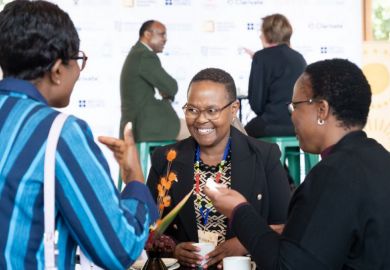Back in March, soon-to-be graduates were contending with the prospect of marking the end of university at home; a significant milestone inevitably dimmed by the inability to celebrate with those who had shared in their success.
At the time universities in the US were in the process of informing candidates of their admissions decision, with few answers on whether they would be able to offer the same benefits advertised during application season. While universities’ administrative offices have pledged partial in-person learning where possible, a return to business as usual has not been guaranteed, and they are continually fielding one question: how can a socially distanced learning experience compensate for the tangible factors that initially made their institutions attractive to incoming students?
The virtual Times Higher Education Student Success Forum on 18 September will assess the impact of these compromises on undergraduates, and whether any long-term improvements can be chiselled out of this “new normal”.
Phil Baty, THE’s chief knowledge officer, said: “Universities were already facing intense scrutiny over how they deliver success for their students – especially in terms of the return on investment on a degree, with success increasingly, and controversially, measured by employment outcomes and graduate salaries. But the global coronavirus pandemic has put even more intense pressure on the issue, raising fundamental questions about the entire higher education enterprise: the role of edtech in the delivery of effective teaching; the value for money of traditional degrees, and the very future of face-to-face, residential campus degrees.”
An array of keynote speeches, panel discussions and workshops will be distributed across three main stages: a European stage, a North American stage, and a Collaboration stage, showcasing the contributions to higher education made by THE’s trusted partners, such as Elsevier, throughout both primary time zones.
Introducing the European stage at 12:00 BST, Chris Havergal, THE’s news editor, will lead a session on how to make online learning an equitable experience for students with varying degrees of access to fundamental resources, joined by Kostis Giannidis, president of the Erasmus Student Network.
Additionally, Wilma De Konig-Martens, vice-president of Radboud University in the Netherlands, will examine how support networks for students with part-time jobs can be improved to safeguard student finances in the wake of future crises, with insights from Anna Rees, a current student at Cardiff University.
The European stage’s final panel will address the foreseeable mental health concerns of students navigating their studies in the midst of a pandemic, featuring Nicola Byrom, director of SMaRteN, the UKRI-funded Student Mental Health Research Network, among other university leaders.
Understanding the effects of the pandemic on places of tertiary education in the US, which boasts the highest volume of top universities, will be explored on the North American stage, starting at 16:55 BST. Paul Basken, THE’s North America editor, said: “US universities have long known they’ll need to figure out ways of incorporating online delivery into their operations – the pandemic has pushed them to make those decisions much more quickly, with the possible survival of their institutions on the line.”
Duncan Ross, THE’s chief data officer, will join Wall Street Journal reporter David M. Ewalt to conduct an in-depth masterclass on the methodology of the WSJ’s US College Rankings 2021, which will see their international release on the morning of 18 September, while group conversations on the North American stage will heed the sector’s response to social movements that have gained traction in 2020.
In the wake of the renewed civil unrest in the US spurred by the murder of George Floyd, universities have been forced to examine how they contribute to the inequalities felt by both minority students and staff, and are under pressure to follow through on commitments to achieving racial justice. Peniel Joseph, founding director of the centre for the study of race and democracy at the University of Texas at Austin, will investigate how systems that uphold racially insensitive standards can be amended to provide a truly inclusive space for the entire student body and staff, signifying how this “new normal” can be an opportunity for growth.
Miriam Feldblum, co-founder and executive director of the Presidents’ Alliance on Higher Education and Immigration, will scrutinise the impact of diminishing numbers of international students in the US, where they account for 6 per cent of the country’s undergraduate population; and Bridget Burns, executive director of the University Innovation Alliance, will speak during the final session on tackling student retention in the time of Covid-19.
“I’m delighted that we are able to gather, across two key time zones, for an international exchange of ideas about how universities continue to deliver student success,” Mr Baty concluded.
leah.reitman@timeshighereducation.com
Find out more and register for the virtual Student Success Forum on 18 September.
Register to continue
Why register?
- Registration is free and only takes a moment
- Once registered, you can read 3 articles a month
- Sign up for our newsletter
Subscribe
Or subscribe for unlimited access to:
- Unlimited access to news, views, insights & reviews
- Digital editions
- Digital access to THE’s university and college rankings analysis
Already registered or a current subscriber? Login




